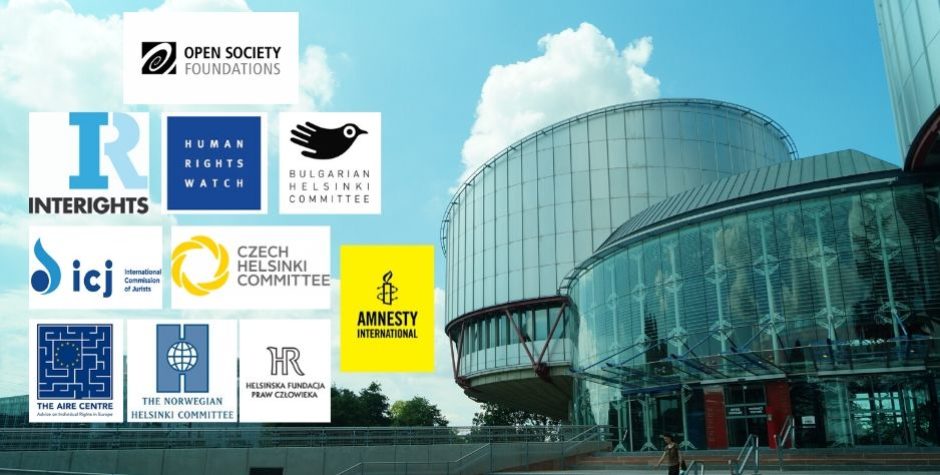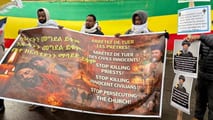In February 2020, Grégor Puppinck, director of the ECLJ, and Delphine Loiseau, now a lawyer, published the report "NGOs and judges at the ECHR, 2009 - 2019". This study revealed that some of the judges sitting at the European Court of Human Rights (ECHR) are former officials or collaborators of NGOs from the "Soros galaxy" that are very active before this Court. The seven NGOs identified in the report were the Open Society Foundations (OSF), the Helsinki Committees, the International Commission of Jurists, Amnesty International, Human Rights Watch, Interights and the A.I.R.E. Centre.
When their NGO was officially involved in the proceedings, the judges sometimes withdrew from the case (withdrawal) but more often than not chose to sit in a conflict-of-interest situation, to the detriment of their independence and impartiality.
The February 2020 report gave these numbers for the years 2009-2019:
- Out of 100 permanent judges, 22 had a connection to one of the seven identified NGOs. 18 of these 22 judges were at least once in a situation of conflict-of-interest.
- In at least 185 cases judged, one of these seven NGOs was officially involved in the proceedings. Of these 185 cases, in 88 cases, conflicts-of-interest were identified.
- There were only 12 cases of withdrawals in which a judge withdrew because of an apparent link to an NGO involved in the case.
Grégor Puppinck’s report received media coverage throughout Europe, as well as reactions from states (Bulgaria, Russia), politicians and lawyers; and several European institutions were called upon.
One year after its publication, it is time to update the report. What was the involvement of NGOs and the attitude of judges linked to them in the cases judged this year?
Here are some facts, figures and explanations on the independence and impartiality of judges in 2020.
Growing involvement of NGOs in the Court
In cases judged between 2009 and 2019, at least one of the seven NGOs was formally involved in the proceedings in, on average, 18.5 cases per year. For cases judged in 2020, this is the case for 41 of them.
This sharp increase can be seen even though the number of applications decided per year has decreased. Compared to the 2009-2019 average, there is a decrease of about 33%. The NGOs of the "Soros galaxy" are thus strongly increasing their action at the ECHR. This growing involvement does not date from 2020, because before a decision or judgment is rendered, an application can remain pending for several years. The figures for 2020 therefore reveal a strengthening of the action of these NGOs before the Court in recent years.
Continuing conflicts of interest
Of the 41 cases in which at least one of the seven NGOs intervened, in 13 of them, one or two judges sat in a direct conflict of interest situation.[1] In case of intervention of an NGO of the "Soros galaxy" in the procedure, the impartiality of the ECHR is thus not guaranteed in 31% of the cases. These judges sat even though their NGO was defending the application or intervening as a third party. The conflict of interest was then due to the significant tie between the judge(s) and one of the parties to the case.
Compared to the proportion in the period 2009 - 2019, 48%,[2] there is therefore an improvement.
Let's take some examples:
- In the case of Muhammad and Muhammad v. Romania (no. 80982/12), judged by the Grand Chamber on 15 October 2020, Eugenia Crangariu, the lawyer of the Romanian Helsinki Committee, represented the applicants. The Helsinki Foundation for Human Rights in Poland and Amnesty International were third parties, supporting the applicants. Two NGOs initiated and supported this procedure, which aimed at defending two Pakistani nationals in their deportation procedures.
Judges Ganna Yudkivska and Paulo Pinto de Albuquerque sat on the case, despite their strong links with the Helsinki Committee and Amnesty International (respectively).
The Court ruled in favor of the applicants, Pakistanis involved in terrorist activities. It ruled that Romania had violated the procedural guarantees for the expulsion of foreigners (Article 1 of Protocol No. 7 of the European Convention) by sending them back to their country.
- In the case of Mándli and others v. Hungary (no. 63164/16), judged on May 26, 2020, the Helsinki Foundation for Human Rights was a third party, supporting the applicants.
Judge Jolien Schukking sat, despite his former role in the Dutch Helsinki Committee.
The Court ruled in favor of the applicants, journalists whose accreditation to enter the Hungarian Parliament had been suspended, after illegal filming and recording of parliamentarians and their intrusion into a prohibited space. The Court ruled unanimously that Hungary had violated the journalists' freedom of expression (Article 10).
- In the case of K. and others v. Poland (nos. 40503/17, 42902/17 and 43643/17), judged on July 23, 2020, two lawyers from the Helsinki Foundation for Human Rights - Sylwia Gregorczyk-Abram and Mr. Jacek Białas - represented the applicant M.K. In addition, the A. I. R. E. Centre and the International Commission of Jurists (ICJ) were third parties, in support of the applicants.
Judge Tim Eicke sat, despite his former position on the board of directors of the A. I. R. E. Centre for eight years.
The court ruled in favor of the applicants, Russians of Chechen origin seeking asylum. It ruled that Poland had not offered sufficient guarantees to protect them from the risk of ill-treatment (Article 3; Article 13 combined with Article 3; Article 4 of Protocol No. 4). Judge Eicke, in a separate opinion, considered that the just satisfaction granted by the Court to the applicants (34,000 euros per family) was not sufficient.
The example of the Ukrainian judge Ganna Yudkivska
Ganna Yudkivska, a Ukrainian lawyer and academic, was elected judge at the ECHR on June 15, 2010. Her term of office, which should have lasted nine years, has not been completed to date. The Ukrainian government was asked to submit a list of three candidates for the election of the next judge by December 6, 2018, which it has not yet done. Therefore, no date has been announced for the election.
As a result of this political situation, Yudkivska continues to serve as a judge on the court nearly two years after her term theoretically ended. Her presence is particularly noticeable in the cases decided in 2020, as she sat seven times in a direct conflict of interest situation. In other words, she was part of the panel of judges to decide seven cases initiated or supported by Helsinki Committees, despite her past professional ties to the Polish, Dutch and Ukrainian branches of the Helsinki network.
Judge Yudkivska, at the end of her term, does not seem to have sought to avoid these situations. While she had been in a conflict-of-interest situation a total of eight times since her election, mostly since 2016, she has been in a conflict of interest situation seven more times in just one year.
Bulgaria’s request for a withdrawal of Judge Yonko Grozev
Yonko Grozev is both the founder of the Bulgarian Helsinki Committee, of which he was a member from 1992 and 2013, and the current Bulgarian judge at the ECHR, since 2015. Yet, it was this same Committee, together with lawyer Adela Kachaunova, that brought the case D.K. v. Bulgaria (no. 76336/16). The judgment, published on December 8, 2020, reflects the reaction of the Government of Bulgaria, Judge Grozev and other judges to this conflict-of-interest situation. Here are some excerpts:
"On March 9, 2020, the Government requested the deportation of Judge Grozev because he was a founder of the Bulgarian Helsinki Committee and its member between 1992 and 2013. On 17 November 2020, relying on the provisions of Article 26 § 4 of the Convention and 28 § 2 of the Rules of Court, the Chamber, composed under Rule 28 § 4 thereof, rejected this request" (§ 4).
The Court, having ruled in favour of the applicant, "considers it reasonable to award the applicant the sum of EUR 1,500, including all costs, to be paid directly into the bank account of the Bulgarian Helsinki Committee" (§ 102). This direct transfer shows once again that the lawyer did not act on her own behalf, but on behalf of the Bulgarian Helsinki Committee.
This is not the first time that Judge Grozev has sat in cases, all against Bulgaria, brought by the Committee he founded. In three of them (Aneva and others, no. 66997/13; Ivanova and Cherkezov, no. 46577/15; Panayotova and others, no. 12509/13), the same lawyer, Adela Kachaunova, represented the applicants on behalf of the Helsinki Committee. The choice of Judge Grozev not to withdraw himself is not particularly surprising, given that he had already been identified as a judge who was particularly lacking in impartiality, which was subsequently confirmed by reports in the Bulgarian media.
What is new is the fact that the Bulgarian government has expressly requested the withdrawal. The Bulgarian Minister of Justice, in reaction to the ECLJ's report, had publicly mentioned the possibility of Judge Grozev’s recusal in March 2020, while recalling that it was up to the ECHR to decide. The Bulgarian judge's reaction was to assume his militancy and political opposition to the government.
The five withdrawals of Judge Grozev
In the above-mentioned case of D.K. v. Bulgaria, Judge Grozev refused to withdraw himself, which the other judges of the Chamber did not contest. In another case decided in 2020, Khadija Ismayilova v. Azerbaijan (No. 2) (No. 30778/15), Yonko Grozev sat despite the presence of the Helsinki Foundation for Human Rights among the third parties. On the other hand, in four other cases initiated by the Bulgarian Helsinki Committee and in another case initiated by another Helsinki NGO, Judge Grozev chose to withdraw. Already before 2020, Judge Grozev was in a conflict-of-interest situation nine times, while on nine other occasions he had withdrew himself precisely to avoid such a situation.
Why does the same judge have opposite attitudes in a seemingly similar configuration? It is difficult to answer this question: an analysis of the five cases of deferrals in 2020 does provide some clues:
- The case of T. v. Bulgaria (no. 41701/16), judged on July 9, 2020, was supported by the Bulgarian Helsinki Committee. Judge Grozev deported himself and therefore did not sit. This deportation seems to be due not only to the support of the NGO he founded, but also to the presence of Natasha Dobreva as the petitioner's lawyer. Mrs. Dobreva is the former partner of Yonko Grozev, in a law firm that he founded and that bears both their names (Grozev&Dobreva). Mrs. Dobreva worked for nine years in this firm.[3] In this case, Judge Grozev had therefore founded both the law firm of the applicant's lawyer and the third-party NGO.
- The applications against Bulgaria Vasilev and Union of Macedonian Repressed of Bulgaria Victims of Communist Terror (no. 23702/15), Fartunova and Kolenichev (no. 39017/12) and Yordanovi (no. 11157/11), judged on May 28, June 16 and September 3, 2020, respectively, were initiated by the Bulgarian Helsinki Committee, whose president, Krasimir Kanev, represented the applicants. Judge Grozev withdrew and therefore did not sit. This deportation seems to be because the lawyer was not only president of the Bulgarian Helsinki Committee, but had co-founded it with Yonko Grozev in 1992.[4] The link between the two men is therefore probably particularly important. In 2014, this link had moreover led the Bulgarian media to accuse Mr. Kanev of a conflict of interest when he was part of the selection committee for Bulgarian candidates for the position of judge at the ECHR. That committee had selected Mr. Grozev's candidacy.
In Fartunova and Kolenichev v. Bulgaria, (no. 39017/12) not only did lawyer Krasimir Kanev represent the applicants, but one of the two applicants, Daniela Fartunova, was herself a lawyer on the Bulgarian Helsinki Committee and in that capacity had worked closely with Yonko Grozev in the past. For example, they worked together in the Legal Defense Programme of the Bulgarian Helsinki Committee.[5] This connection with Ms. Fartunova further strengthens the relationship between Mr. Grozev and the applicants in this case.
- In the case 'Macedonian Club for Ethnic Tolerance in Bulgaria’ and Radonov v. Bulgaria (no. 67197/13), judged on May 28, 2020, the applicant’s lawyer, Toni Menkinoski, is a member of the North Macedonian Helsinki Committee.[6] Additional links that might explain Judge Grozev’s choice to withdraw are not visible.
From the cases tried in 2020, it seems that Yonko Grozev is not embarrassed to rule in a case initiated or supported by his former NGO or by an NGO in the same network. In cases where this judge withdrew, it was because there seemed to be an even stronger link with one of the parties. This link may be either a stronger institutional link or a personal link that doubles the institutional link. In one of the five cases where Judge Grozev deported, however, we were unable to identify such a link.
The departure of two judges from the "Soros galaxy"
During 2020, the mandates of judges Julia Laffranque (Estonia) and Paulo Pinto de Albuquerque (Portugal) ended. Judge Laffranque had been an active member of the Open Estonia Foundation, the Estonian branch of the Open Society Foundation (OSF), and had sat on at least two occasions in conflict of interest cases at the Court.[7] Judge Pinto de Albuquerque had significant responsibilities at Amnesty International before becoming a judge and had also sat in two cases initiated or supported by the same NGO.[8]
Of the four new judges elected in 2020 (Peeter Roosma - Estonia, Ana Maria Guerra Martins - Portugal, Mattias Guyomar - France, Anja Seibert-Fohr - Germany), none has a significant connection to the seven NGOs identified in the report. The only existing link is minor and not worth retaining: Peeter Roosma received a scholarship from the Open Estonia Foundation for his Master's degree at the Central European University (Budapest), founded by George Soros.
The consequence of the departures and arrivals of judges is therefore to reduce the number of judges with strong links to NGOs of the "Soros galaxy". Thus, whereas on January 1, 2020, there were 13 judges out of 47, there are now 11 who are former officials or collaborators of these NGOs.
However, it is important to remain vigilant, because some NGO collaborators of the "Soros galaxy" are still selected by the States for the function of judges at the ECHR. For example, Belgium recently chose, among the three candidates proposed, the lawyer Maïté De Rue,[9] involved in proceedings at the ECHR from New York, as a member of the strategic litigation team of the Open Society Justice Initiative (OSIJ).[10] The election of the future Belgian judge is scheduled for April 2021.
__________
[1] The following is a comprehensive list of cases decided in 2020 for which at least one direct conflict of interest has been identified (in chronological order, with only the judges and parties involved):
- N.D. and N.T. v. Spain, Nos. 8675/15 and 8697/15, 13/02: Judges Kucsko-Stadlmayer and Eicke - Third Parties: A.I.R.E. Centre, ICJ.
- Khadija Ismayilova v. Azerbaijan (No. 2), No. 30778/15, 27/02: Judges Yudkivska and Grozev - Third-party: a Helsinki Committee.
- M.N. and Others v. Belgium, No. 3599/18, 05/03: Judge Motoc - Third party: ICJ.
- Mándli and others v. Hungary, No. 63164/16, 26/05: Judge Schukking - Third party: a Helsinki Committee.
- Fartunova and Kolenichev v. Bulgaria, No. 39017/12, 16/06: Judge Yudkivska - Applicants represented by a Helsinki Committee.
- Bagirov v. Azerbaijan, nos. 81024/12 and 28198/15, 25/06: Judge Kucsko-Stadlmayer - Third party: ICJ.
- Yunusova and Yunusov v. Azerbaijan (No. 2), No. 68817/14, 16/07: Judge Yudkivska - Applicants represented by a Helsinki Committee.
- Y.T. v. Bulgaria, No. 41701/16, 09/07: Judge Yudkivska - Third party: a Helsinki Committee.
- M.K. and others v. Poland, nos. 40503/17, 42902/17 and 43643/17, 23/07: Judge Eicke - Tierce-parte: A.I.R.E. Centre.
- Mirgadirov v. Azerbaijan and Turkey, No. 62775/14, 17/09: Judge Yudkivska - Third party: a Helsinki Committee.
- Muhammad and Muhammad v. Romania, no. 80982/12, 15/10: Judges Yudkivska and de Albuquerque - Applicants represented by a Helsinki Committee; Third parties: a Helsinki Committee, Amnesty International.
- X and Y v. Northern Macedonia, no. 173/17, 05/11: Judge Yudkivska - Third party: a Helsinki Committee.
- D.K. v. Bulgaria, no. 76336/16, 08/12: Judge Grozev - Applicant represented by a Helsinki Committee.
[2] Of the 185 cases tried between 2009 and 2019 in which at least one of these NGOs was involved, the report identified 88 cases of conflict of interest, i.e., 48% of these cases.
[3] See his Linkedin profile (accessed on 18/01/2020).
[4] See his short biography on the Bulgarian Helsinki Committee website (accessed on 18/01/2020).
[5] See for example the 2006 activity report of the Bulgarian Helsinki Committee, p. 6.
[6] See for example the 2008 activity report of the North Macedonian Helsinki Committee.
[7] See Annex 1 to the report.
[8] Ibid.
[9] Matthias Verbergt, "Vivaldi stuurt jonge, progressieve rechter naar Straatsburg," De Standaard (website), January 8, 2021.
[10] See her Linkedin profile (accessed 18/01/2020).













